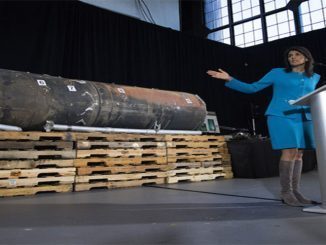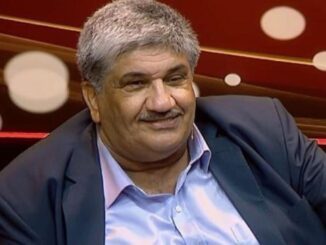
A bipartisan group of senior senators said on Tuesday that a classified briefing by the C.I.A. director had only solidified their belief that Mohammed bin Salman, the crown prince of Saudi Arabia, ordered the killing of the Saudi dissident Jamal Khashoggi.
Prince Mohammed “is a wrecking ball,” Senator Lindsey Graham, Republican of South Carolina, told reporters after an hourlong briefing by the C.I.A. director, Gina Haspel. “I think he’s complicit in the murder of Mr. Khashoggi to the highest level possible.”
Senator Richard C. Shelby, Republican of Alabama and the Appropriations Committee chairman, echoed that “all evidence points to that, that all this leads back to the crown prince.”
“This is conduct that none of us in America would approve of in any way,” Mr. Shelby said.
The clear and unusually biting assessment put Republican senators at odds with the White House, which has steadfastly refused to cast blame on Saudi Arabia’s leadership for the grisly death of Mr. Khashoggi, an American resident and Washington Post columnist. His killing prompted international outrage over the kingdom’s heavy-handed tactics and renewed attention to the Saudi-led war in Yemen.
Senators were eager to hear directly from Ms. Haspel about what officials have described as the C.I.A.’s conclusion that Prince Mohammed had ordered Mr. Khashoggi’s killing. The intelligence agency is also believed to have evidence that the crown prince communicated repeatedly with an aide who commanded the team that assassinated Mr. Khashoggi, around the time of the journalist’s death on Oct. 2.
Yet lawmakers remained divided over what steps to take next, after a stinging vote last week to consider a measure cutting off American military aid to Saudi Arabia’s bombing campaign.
Other punishments being considered included sanctions against Prince Mohammed and others involved in Mr. Khashoggi’s killing — even as it remained unclear how that would work against the de facto Saudi leader, and whether it would upend the broader relationship between the United States and the kingdom.
“Somebody should be punished, but the question is: ‘How do you separate the Saudi crown prince from the nation itself?’” Mr. Shelby said.
Tuesday’s briefing offered a stark contrast to one given a week ago to the entire Senate by Secretary of State Mike Pompeo and Defense Secretary Jim Mattis. Senators emerged from that session largely unpersuaded, and irritated, by the Trump administration’s case for the Saudi-led war in Yemen; they had griped that Ms. Haspel was not there to provide a fuller understanding of Mr. Khashoggi’s death.
Though there also was grumbling on Tuesday that more senators had not been allowed to attend the closed-door session with Ms. Haspel, those who did praised the C.I.A. for its forthrightness.
Mr. Graham had initially threatened to withhold support for legislative priorities until he was briefed by Ms. Haspel. He said on Tuesday that it was clear Mr. Pompeo and Mr. Mattis were being “good soldiers” for the White House when they briefed senators last week.
But he also called their assessments misleading, and alluded to Mr. Mattis’s insistence that American officials had seen “no smoking gun”to indicate Prince Mohammed was to blame in Mr. Khashoggi’s killing.
“There is not a smoking gun, there’s a smoking saw,” Mr. Graham said.
“You have to be willfully blind” not to see it, he said.
He was referring to a bone saw that Turkish officials have said was used to dismember Mr. Khashoggi at the Saudi Consulate in Istanbul.
President Trump has maintained his support for Saudi Arabia and, specifically, Prince Mohammed. In an extraordinary statement last month that appeared calculated to end debate on the killing, Mr. Trump said it was possible that the crown prince “had knowledge of this tragic event — maybe he did and maybe he didn’t!”
“We may never know all of the facts surrounding the murder of Mr. Jamal Khashoggi,” Mr. Trump added in the Nov. 20 statement. “In any case, our relationship is with the Kingdom of Saudi Arabia.”
White House officials said on Tuesday that they planned to dispatch Mr. Pompeo and Mr. Mattis — but most likely not Ms. Haspel — to brief all House members next week. It was not clear if the two men would merely repeat their request for continuing the war effort in Yemen, or if they would discuss Mr. Khashoggi.
Senators did not say exactly what Ms. Haspel said during the classified session that convinced them of Prince Mohammed’s guilt. The briefing was offered only to the top Republicans and Democrats on the Armed Services, Foreign Relations, Appropriations and Intelligence Committees, as well as to other Senate leaders.
But after the discussion, Senator Bob Corker, Republican of Tennessee and the chairman of the Foreign Relations Committee, said there was “no question in my mind” that the crown prince had ordered the killing.
“The royal family looks to what the president says, and so do people in the region,” he said.
Referring to Prince Mohammed by his initials, Mr. Corker added, “It would appear to them, based on what’s been said, that someone like M.B.S. can murder people and have immunity. That’s the reason it’s important to address this differently than the way it’s been addressed.”
Democrats also said they were unconvinced by the White House’s defense of the crown prince.
Senator Chuck Schumer of New York, the minority leader, said the briefing “reinforced the need for a strong response to the murder of Jamal Khashoggi.”
Senator Robert Menendez of New Jersey, the top Democrat on the Foreign Relations Committee, said it had only hardened his position that Saudi Arabia must face “a real set of consequences” — both for Mr. Khashoggi’s death and the bloodshed in Yemen.
Since 2015, when neighboring Saudi Arabia launched a bombing campaign against a Houthi uprising in Yemen, an estimated 85,000 children are believed to have died of hunger. Fourteen million people — half of Yemen’s population — could soon be threatened with starvation if the war continues.
Saudi Arabia has accused the Houthis of launching rockets at its cities, including at Riyadh, the capital. The Pentagon has said that American military assistance to the Saudi-led campaign in Yemen is limited to aircraft refueling, logistics and general intelligence sharing.
In a rebuke last week that largely amounted to a symbolic step, the Senate voted 63 to 37 to begin debating a measure to limit presidential war powers in Yemen. (The resolution would not, however, end American operations in Yemen against Al Qaeda, which is targeted in a separate bombing campaign.)
The measure could be put to a final vote this week. But even if it wins Senate approval, there is little chance that House lawmakers will consider it this year.
Senator Christopher S. Murphy, Democrat of Connecticut, said he was aware of no new information to emerge on Tuesday that would dissuade him from demanding an end to American military support to the Saudi assault in Yemen.
“The idea that many Republicans have that the administration was going to pull a rabbit out of the hat does not seem to be happening,” Mr. Murphy said. “So, I am not sure that there are a lot of votes moving.”
Mr. Menendez and Mr. Graham have called for even broader penalties against Saudi Arabia, including suspending weapons sales and cementing a ban on American refueling of Saudi coalition aircraft in Yemen. Additionally, their plan would impose economic sanctions against people who are found responsible for Mr. Khashoggi’s death, have blocked humanitarian relief in Yemen or have supported the Houthi rebels.
But privately, some Republicans on Capitol Hill who believe that Prince Mohammed ordered the killing have said that they support the administration’s decision not to impose significant consequences on Saudi Arabia, a key Middle East ally. They argue that the kingdom’s support is needed to confront threats from Iran.



